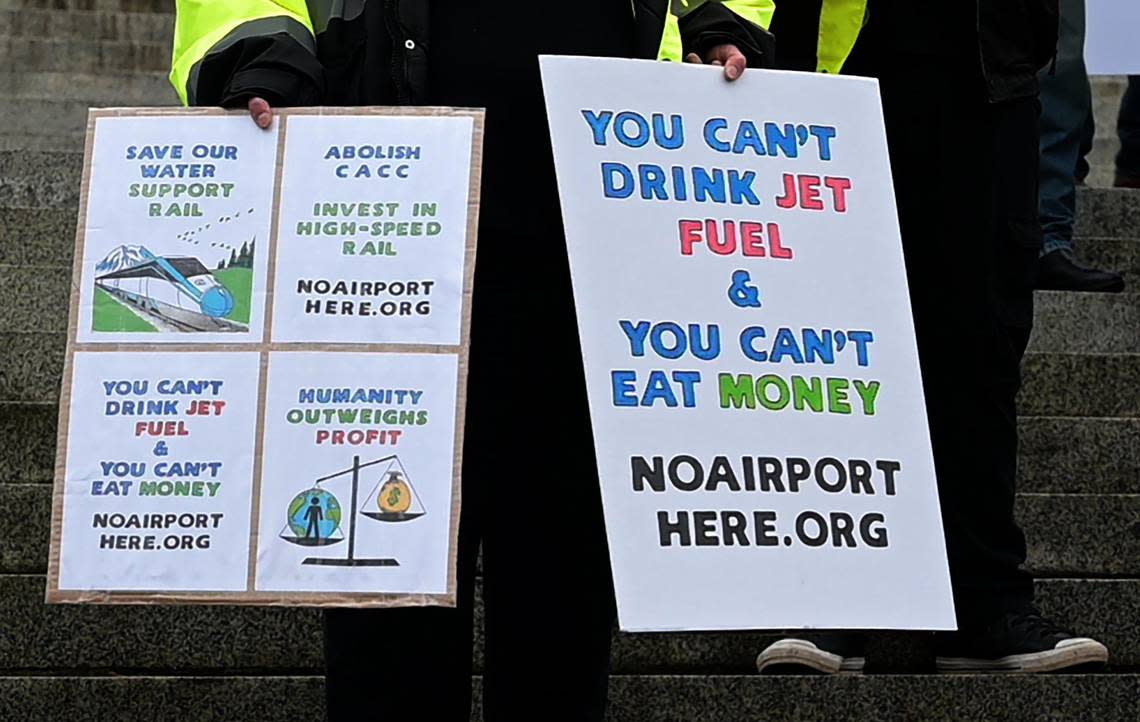Could new commission restart WA airport process? Here’s what we know about new bill

The Commercial Aviation Coordinating Commission could be replaced by a working group with a similar function: investigating the potential for a new or expanded airport to meet projected future travel needs in Washington.
Except under House Bill 1791, the similarly-named Commercial Aviation Coordinating Work Group wouldn’t be tasked with recommending any particular site option.
“It’s not about that anymore,” Rep. Jake Fey, D-Tacoma, told The News Tribune on Tuesday.
Instead, the bipartisan legislation introduced late Monday puts the focus much more on analysis and strays from what Fey said were “artificial” timelines for identifying preferred locations.
Sponsored by Fey and Tom Dent, R-Moses Lake, along with 10 other legislators, the bill would direct the new working group to broaden the review of airport sites and report back on strengths and weaknesses, consider potential community and environmental impacts and involve federal and local stakeholders in its process, among other duties.
The bill, which Dent revealed in December was in the works to reset the ongoing site-selection process, appears to be intended to take a holistic approach into assessing the state of aviation in Washington and allows the working group to mull alternatives to pursuing additional airport capacity.
“The state commercial aviation coordinating work group shall comprehensively evaluate the long-range commercial aviation needs of Washington within the broader context of state transportation needs and the specific needs of western Washington,” the bill reads.
If passed and signed by Gov. Jay Inslee, the bill would take effect immediately, scrapping the CACC and its current mission of recommending an airport site to state lawmakers.
Jake Pool, a lead organizer with the Coalition Against Graham and Eatonville-Roy Airports, said there were “definitely some gains” in the bill and that sponsors had “delivered what they promised.”
The bill provides more criteria in the site-review process and more protections for three rural sites in Pierce and Thurston County that are currently being considered by the CACC for a potential new airport, according to Pool.
Not entirely removing those sites from consideration is “not enough of a win to a lot of people,” he said. The coalition will seek amendments to guarantee those sites won’t be revisited and to establish clear timelines for any decision on siting a new airport or expanding an existing one, according to Pool.
“It doesn’t release the public that is currently concerned from being able to move on and doesn’t give them any reassurances,” he said.
Amid projections that the Puget Sound will be unable to accommodate 27 million annual passengers by 2050, lawmakers embarked on a search for a new airport site in 2019. The state-created CACC narrowed down options to three sites in Pierce and Thurston County in September, setting off a wave of opposition from residents, tribal groups, local lawmakers and others over health, environmental, wildlife and livelihood concerns.
As of now, the CACC is expected to make its final recommendation to the Legislature by June, although acting Chairman Warren Hendrickson — a non-voting member — has said he sees a “low probability” that either location is endorsed by the commission.
What the bill does
The working group that would supplant the CACC must present Inslee and transportation committees with a progress report by Jan. 1 that compares the positives and negatives of each site it reviews — a collection of previously studied and new locations.
A report would be due every year thereafter, according to the bill.
The group must consider the potential impacts of a new or expanded airport on the community and environment; its fit with county master plans, local zoning and existing airspace operations; and the costs of construction and infrastructure.
The legislation also directs the group to perform outreach to federal agencies such as the FAA, tribal and environmental groups, local communities and economic development agencies, and to identify infrastructure shortfalls and recommend how those could be addressed.
The make-up of the working group’s voting membership is proposed to include 10 citizen, community group or environmental representatives and nine from the transportation sector, including airlines and airports. It would represent a shift from the CACC, whose voting membership largely consists of transportation industry officials.
Like Senate Bill 5370, which created the CACC, HB 1791 precludes the working group from considering construction or expansion of an airport that would be incompatible with nearby military operations. The new bill uses the terminology “shall not” as opposed to the “may not” found in the CACC legislation, which Fey said was a deliberate distinction.
It also prevents the group from reviewing airport expansion opportunities in King County but — unlike SB 5370 — the verbiage does not explicitly restrict new airports. The bill is intended to block any prospects of expanding Sea-Tac and Boeing Field (King County International Airport) but permit studying the possibility of a new facility in the county, according to Fey.
The bill would also require that the working group raise and maintain awareness of its work, noting that the “pandemic interfered with the ability of the commercial aviation coordinating commission to perform a thorough and complete study of the possibility of a new commercial airport ...”
More than $400,000 in state funds currently proposed for the CACC would be allocated to the working group, including at least $150,000 specifically for engagement, according to the bill.
Editor’s note: A previous version of this story misstated the day that House Bill 1791 was introduced.
